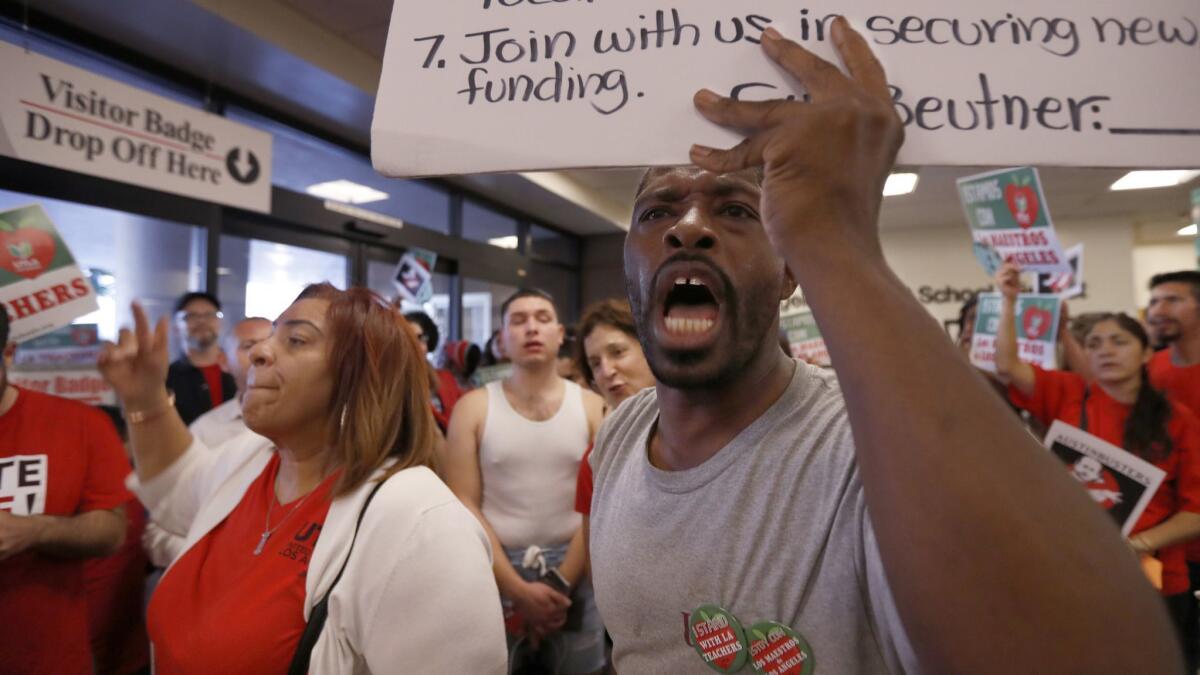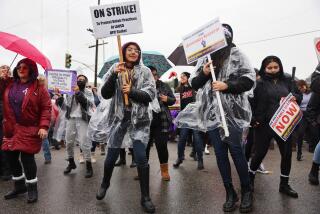Q&A: L.A. teachers could strike a few weeks from now. Here’s what you need to know

If you are in any way associated with L.A. public schools, you’ve probably been hearing quite a bit about the possibility of a teachers strike. The teachers union could call for one in the next few weeks.
Talks between the union and the Los Angeles Unified School District appear to be going nowhere, with each side suggesting terms that the other says it cannot accept. And just this week, a demonstration organized by the union and its allies shut down a Board of Education meeting at the district’s headquarters just west of downtown.
What happens to students if there’s a strike? What’s all the fighting about anyway?
Here is a primer for parents and others who would be affected.
How imminent is a strike?
Enjoy the winter holidays and then you can start worrying. Nothing will happen before January. At the start of the school year, signs pointed to a strike in October — but district officials effectively delayed the start of mediation, which is a step in the process that could clear the way for a legal strike. Even though mediation efforts failed, they lasted long enough to push back the start of a potential strike.
Where do things stand in the negotiation process?
The two parties have just completed a step called fact-finding, in which an outside panel tries to develop a set of facts that could be accepted by both sides. The goal is to use that common understanding to reach a settlement. A draft of the fact-finders’ report should reach both sides by Friday, said L.A. Unified General Counsel David Holmquist. Both parties will then have three days to respond. About 10 days after that, the report should become public — if it doesn’t leak out sooner.
Such reports typically include recommendations on how to resolve disagreements that are keeping the parties apart.
If the parties still cannot reach an agreement, the district could then impose a contract and the union could call a strike.
Would schools be open during a teachers strike?
Yes. The school district’s plan would be to keep schools open and operating as normally as possible. A district guide advises parents that “students are expected to attend school every day. Schools will be open and students will participate in instructional programs.”
The guide also states: “School hours, morning and after-school programs, and meals will NOT change. The regular school schedule will be observed.”
Even if schools stay open during a strike, will they operate as usual?
That hardly seems likely. Teachers matter. Also, other union-represented employees will be under pressure not to cross picket lines — though striking teachers are not likely to put such pressure on parents. The district will bring in substitute teachers, but regular substitutes also belong to the union. So don’t expect familiar faces in the classroom, even among the subs.
If the district does not find enough substitutes, classes could be combined into larger groups. Schools also are likely to rely more on online programs — with substitute teachers assigning students to do coursework on their own on computers.
Top priorities for the district would be student safety and student meals. If parents were not reassured that the schools were safe during a strike, they probably would keep children home — and the school district receives most of its funding based on student attendance. And meals are especially important because about 80% of district families are low income and many have come to rely on district meal programs.
Do teachers get paid during a strike?
No, but the union has a strike fund that could be used to ease the hardship of a walkout for its members.
Where do the two sides stand on salary? How far apart are they?
The district’s latest proposal offers a 3% raise starting retroactively on July 1, 2017, followed by an additional 3% raise taking effect on July 1, 2018.
The union wants a 6.5% raise retroactive to July 1, 2016.
L.A. Unified officials say their offer would increase district costs by $430 million over the three-year life of the contract. They say the union demand would cost $750 million over that same time.
Teachers in L.A. Unified earn between $44,000 and $86,000 per year depending on their education and experience, according to the L.A. County Office of Education, which compiles the data. L.A. Unified says the average teacher salary is $75,000, which reflects the district’s older, more experienced workforce.
In making their case for a larger raise, union leaders talk about how difficult it has become for a teacher to support a family or pay for housing in the Southern California market.
Is this dispute only about the size of the raise?
No. Union leaders want to turn this fight into a broad-based campaign for major increases in local, state and federal education spending, which they say are necessary for student welfare. The union wants the funding to hire many more teachers, which would lower class sizes, as well as to “fully staff” schools with union-represented nurses, librarians and counselors.
The union also wants a greater say in policies that affect both teaching and the management of schools. They want to limit standardized testing, for example, and place some controls over privately operated charter schools, which are mostly non-union and compete with traditional schools for students.
District leaders say they must limit the size of pay increases — to teachers and other employees — because of long-term financial problems. These include growing and potentially crippling pension fund obligations and health benefits for retired employees that are not fully funded into the future.
To make its case that money is available to give teachers more help, the union points to what remained unspent in the district’s budget at the end of the last fiscal year. Recent numbers fixed that amount at $1.99 billion, almost certainly the largest ending balance in district history.
The district contends that $500 million of that balance already is committed to cover 6% raises that are anticipated for teachers and already agreed to for most other employees.
Another $400 million is part of funds that carried over from last year, said Chief Financial Officer Scott Price in a Tuesday presentation to the school board. These funds are already committed to schools and programs, but could be pulled back for other purposes, though not without some disruption at schools.
About $700 million is uncommitted, but Price said that this balance will disappear within three years because the district is spending much more than it is taking in.
Teachers and others contend that the district should be doing more to lobby for increased state and federal funding and also for new taxes that would benefit schools. After Price’s presentation, former school board member David Tokofsky noted that more education funds could become available from the current state budget surplus.
When did teachers last strike? What happened?
The last L.A. teachers strike ran for nine school days in May 1989.
During the strike, about half of all students stayed home, and the district had trouble finding substitutes, especially qualified ones.
Teachers emerged with a 24% pay increase over three years, fueled by word of better-than-expected state tax revenues.
But the wage hikes were not sustainable, in part due to a statewide economic downturn. The three-year contract expired in July 1991. Teachers were forced to take pay cuts the next year. They nearly went on strike again, but ultimately accepted a 10% reduction.

Twitter: @howardblume
More to Read
Start your day right
Sign up for Essential California for news, features and recommendations from the L.A. Times and beyond in your inbox six days a week.
You may occasionally receive promotional content from the Los Angeles Times.







